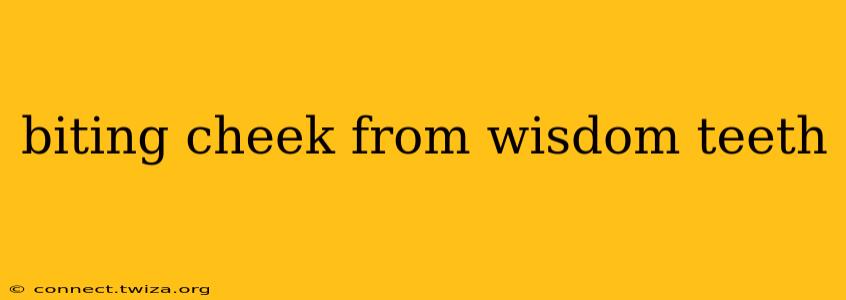Wisdom teeth, those third molars lurking at the back of your mouth, are notorious for causing problems. One of the most common complaints? Biting your cheek. This seemingly minor annoyance can be incredibly painful and frustrating, significantly impacting your daily life. This comprehensive guide delves into why this happens, how to prevent it, and what to do if it occurs.
Why Do I Keep Biting My Cheek When I Have Wisdom Teeth?
The primary reason you bite your cheek with emerging wisdom teeth is inflammation and swelling. As wisdom teeth erupt, they often cause surrounding tissue to become inflamed and swollen. This swelling can alter the normal contours of your mouth, making it harder to gauge the precise position of your teeth and cheeks. The swollen gums and shifted jaw position increase the risk of accidental biting.
Another factor is impacted wisdom teeth. If your wisdom teeth are impacted (meaning they're partially or fully trapped beneath the gum line or bone), they can further displace your other teeth, again leading to an increased likelihood of cheek biting. The pressure of the impacted tooth can also contribute to swelling.
Finally, the positioning of your wisdom teeth itself plays a significant role. If they erupt at an awkward angle, they can easily rub against your cheek, leading to irritation and repeated biting.
How Can I Prevent Biting My Cheek with Wisdom Teeth?
Preventing cheek biting when dealing with wisdom teeth often requires a multi-pronged approach:
- Gentle rinsing: Rinsing your mouth gently with warm salt water several times a day can help reduce inflammation and swelling.
- Soft foods: Stick to a diet of soft foods that require minimal chewing to minimize irritation. Think mashed potatoes, yogurt, smoothies, and soups.
- Over-the-counter pain relievers: Ibuprofen or acetaminophen can help manage pain and reduce swelling. Always follow the recommended dosage.
- Mouthguard: In some cases, a custom-fitted mouthguard can protect your cheeks from being bitten. This is especially beneficial if your teeth are significantly misaligned.
- Dental consultation: The most effective preventative measure is a consultation with your dentist. They can assess your wisdom teeth and recommend the best course of action, which may involve extraction to prevent further problems.
What Should I Do If I Bite My Cheek Because of My Wisdom Teeth?
If you do bite your cheek, here's what you should do:
- Rinse with salt water: This will help clean the wound and prevent infection.
- Apply ice: A cold compress can reduce swelling and pain.
- Avoid irritating foods: Steer clear of spicy, acidic, or crunchy foods that could further irritate the wound.
- Monitor for infection: Look for signs of infection like increased pain, swelling, redness, or pus. If you see any of these signs, contact your dentist immediately.
Does Biting My Cheek Mean I Need My Wisdom Teeth Removed?
Biting your cheek due to wisdom teeth doesn't automatically mean they need removing. However, it's a strong indicator that your wisdom teeth are causing problems. A consultation with your dentist or oral surgeon is crucial to assess the situation. They will be able to determine if extraction is necessary to prevent further issues, including infection, damage to adjacent teeth, or persistent cheek biting.
How Long Does Cheek Biting Last with Wisdom Teeth?
The duration of cheek biting related to wisdom teeth varies depending on the individual and the severity of the problem. It can last for a few days, weeks, or even months. If the discomfort persists or worsens, consult a dentist promptly.
Can Wisdom Teeth Removal Prevent Cheek Biting?
Yes, wisdom teeth removal is a highly effective solution for persistent cheek biting caused by wisdom teeth. Removing the source of the problem eliminates the irritation and swelling, preventing further biting incidents.
Remember, this information is for general knowledge and does not constitute medical advice. Always consult with a qualified dental professional for any concerns about your wisdom teeth or persistent cheek biting. Early intervention can prevent more significant issues down the line.
